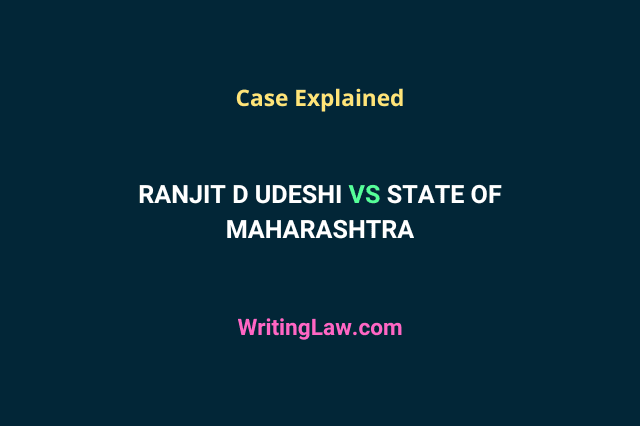
Ranjit D. Udeshi vs State of Maharashtra on 19 August 1964
Criminal Appeal No. 178 of 1962
Date of Judgment: 19/08/1964
The case of Ranjit D Udeshi vs State of Maharashtra (1964) is a landmark decision by the Supreme Court of India that dealt with the issue of obscenity and its implications on freedom of speech and expression under Article 19 of the Indian Constitution.
- Court: Supreme Court of India
- Case Name: Ranjit D. Udeshi vs State of Maharashtra
- Criminal Appeal No.: 178 of 1962
- Equivalent citations: 1965 AIR 881, 1965 SCR (1) 65
- Petitioner: Ranjit D. Udeshi
- Respondent: State of Maharashtra
- Author: Hidayatullah
- Bench: Gajendragadkar, P.B. (Cj), Wanchoo, K.N., Hidayatullah, M., Shah, J.C., Ayyangar, N. Rajagopala
- Date of Judgment: 19/08/1964
- Acts Applied: Constitution of India, 1950, Arts. 19(1)(a) and 19(2) Indian Penal Code, 1860 (Act 45 of 1860) section 292
Here’s everything you need to know about this significant case.
Facts of the Case
The appellant was one of the partners in a firm in Bombay that owned a book stall called Happy Book Stall.
The appellant and other partners were charged under section 292 of the Indian Penal Code for possessing and selling copies of an allegedly obscene book named “Lady Chatterley’s Lover” (unexpurgated edition).
The charges were framed based on the possession for sale of the book by the partners and the sale of the book to a customer by one of the accused individuals.
Issues Raised in the Case
- Whether section 292 of the Indian Penal Code, which deals with obscenity, violates the freedom of speech and expression guaranteed under Article 19(1)(a) of the Indian Constitution.
- Whether the book “Lady Chatterley’s Lover” is obscene within the scope of section 292.
- Whether possession or sale punishable under section 292 of the IPC requires the intention to corrupt the public in general or the purchasers specifically.
Arguments by the Plaintiff (Appellant)
- Section 292 is vague and constitutes an impermissible restriction on the freedom of speech and expression.
- The book should not be considered obscene when viewed as a whole, considering its literary merit, context, and purpose.
- Obscenity should not be judged by the standards of an immature or abnormal person but by a normal individual.
Arguments by the Defendant (State of Maharashtra)
- Section 292 is valid and doesn’t infringe upon freedom of speech as it’s within the constitutional exception.
- The book “Lady Chatterley’s Lover” is obscene under section 292 of the IPC.
- Possession or sale doesn’t require the specific intent to corrupt but may be punishable based on a more generalised guilty intention.
Decision and Principles Laid Down
The Supreme Court held that section 292 of the Indian Penal Code, which deals with obscenity, is valid and doesn’t infringe upon the freedom of speech and expression.
The court determined that the book, “Lady Chatterley’s Lover,” in its entirety, passed the permissible limits of obscenity, considering community standards and social gain.
The judgment emphasised that obscenity is not entitled to constitutional protection and must yield to public decency and morality.
The ruling established that obscenity isn’t to be judged solely by isolated passages but by its overall effect and potential to deprave or corrupt individuals susceptible to its influence.
The court upheld the validity of section 292 of the Indian Penal Code, stating that it aimed to protect public decency and morality.
The judgment affirmed that obscenity was not constitutionally protected under freedom of speech and expression, as it fell outside the realm of protected speech.
It laid down the “Hicklin Test,” emphasising the potentiality of an object to deprave and corrupt individuals as a criterion for obscenity.
The court clarified that while treating sex and nudity in art or literature wasn’t necessarily obscene, obscenity lay in content that appealed to the carnal side of human nature and offended modesty and decency.
Lady Chatterley’s Lover, when assessed separately and as a whole, was deemed to cross the permissible limits of obscenity based on community standards without any significant social gain.
Conclusion
The High Court’s dismissal of the revision petition was upheld, and the Supreme Court consequently dismissed the appeal. The court ruled against the appellant, holding that the book in question fell within the scope of obscenity under section 292 of the Indian Penal Code.
“Lady Chatterley’s Lover” by DH Lawrence faced censorship and was banned in India in 1964.
- What Is the Burden of Proof Under the PMLA? - 18th April 2024
- Ranjit D Udeshi vs State of Maharashtra – Case Explained - 11th April 2024
- What Is Proceeds of Crime Under PMLA (With Case Laws) - 7th April 2024







